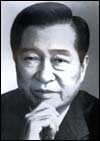 The Norwegian Nobel Committee has decided to award the Nobel Peace Prize for 2000 to Kim Dae-jung for his work for democracy and human rights in South Korea and in East Asia in general, and for peace and reconciliation with North Korea in particular.
The Norwegian Nobel Committee has decided to award the Nobel Peace Prize for 2000 to Kim Dae-jung for his work for democracy and human rights in South Korea and in East Asia in general, and for peace and reconciliation with North Korea in particular.In the course of South Korea's decades of authoritarian rule, despite repeated threats on his life and long periods in exile, Kim Dae-jung gradually emerged as his country's leading spokesman for democracy. His election in 1997 as the republic's president marked South Korea's definitive entry among the world's democracies. As president, Kim Dae-jung has sought to consolidate democratic government and to promote internal reconciliation within South Korea. With great moral strength, Kim Dae-jung has stood out in East Asia as a leading defender of universal human rights against attempts to limit the relevance of those rights in Asia. His commitment in favour of democracy in Burma and against repression in East Timor has been considerable. Through his ", Kim Dae-jung has attempted to overcome more than fifty years of war and hostility between North and South Korea. His visit to North Korea gave impetus to a process which has reduced tension between the two countries. There may now be hope that the cold war will also come to an end in Korea. Kim Dae-jung has worked for South Korea's reconciliation with other neighbouring countries, especially Japan. The Norwegian Nobel Committee wishes to express its recognition of the contributions made by North Korea's and other countries' leaders to advance reconciliation and possible reunification on the Korean peninsula. Oslo, 13 October 2000 Norwegian Nobel Institute Drammensveien 19, N-0255 Oslo, Norway Website: www.nobel.no (Link to be opened in new window). |
|
BOES.ORG International Campaign to Ban Landmines (ICBL) ICBL NGO-links |
Laureates 2004: Wangari Maathai. For her contribution to sustainable development, democracy and peace. She thinks globally and acts locally. 2003: Shirin Ebadi, Iran, 1947-. Lawyer and human rights activist, for her efforts for democracy and human rights. She has focused especially on the struggle for the rights of women and children. 2002: Jimmy Carter, USA, 1924-. For his decades of untiring effort to find peaceful solutions to international conflicts. 2001: The prize was divided equally between: The United Nations ( U.N.) and its Secretary-General, Kofi Annan, Ghana, 1938- For their work for a better organized and more peaceful world. 2000: Kim Dae Jung, Republic of Korea, 1925-. For his work for democracy and human rights in South Korea and in East Asia in general, and for peace and reconciliation with North Korea in particular. 1999: Doctors Without Borders (Médecins Sans Frontières) In recognition of the organisation's pioneering humanitarian work on several continents. 1998: The prize was divided equally between: John Hume, Northern Ireland, 1937-; and David Trimble, Northern Ireland, 1944-. For their efforts to find a peaceful solution to the conflict in Northern Ireland. 1997: The prize was divided equally between: International Campaign to Ban Landmines (ICBL) and Jody Williams, USA, 1950-. 1979: Mother Teresa, India, 1914-1997. Leader of the Order of the Missionaries of Charity. |
|
|